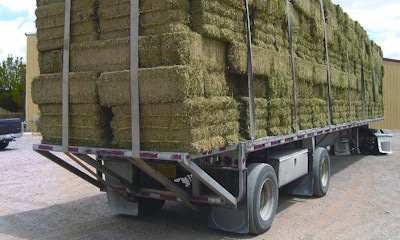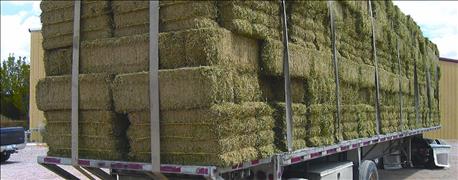
One year ago during the 2015 Indiana General Assembly, legislators promised they would talk about road funding in the 2016 session. This is one promise they kept. They not only talked about it, but took action. Whether they took enough action for a first step depends upon your point of view.
Oh, yes, and in between last session and this session, there was the bridge repair incident that closed I-65 northbound just north of Lafayette for weeks. Resulting accidents and fatalities turning the topic into a political football, and instead of just an issue to talk about in the 2016 session, it became a priority issue.

CAN ROADS HANDLE THIS? Some county officials are already concerned that their roads aren’t in condition to handle large semi-trailers, especially in the winter and early spring months.
“There were a lot of ideas out there and several bills in the beginning,” says Katrina Hall, director of legislative services for Indiana Farm Bureau. “We were interested because our members are concerned about finding more funding to maintain and improve roads and bridges in rural counties.”
In fact, a farmer reports that the Union County Commissioners held a meeting recently to explain a proposed frost law that would limit truck traffic to trucks of 16,000 pounds or less on rural roads from January through March. The plan would include exemptions but at least at the beginning, grain trucks just hauling grain to market weren’t exempted. The proposal was apparently in response to numerous complaints from motorists about the condition of roads in the county.
Meanwhile at the legislature the talk focused on funding. While some wanted an increase in the gasoline tax and others wanted a hike in cigarette taxes to offset that decrease in state revenue, none of that survived. The pressure from the governor and legislative leaders was too strong, as they insisted on no new taxes.
Whether new taxes were passed or not, again, depends upon your point of view. The bill redirects a sizable amount of money to the Indiana Department of Transportation, which is not a tax. However, it gives local towns and cities the ability to implement a wheel tax if they choose. Before this was an option only for counties.
“It’s a good first start as a piece of legislation,” Hall repeats. “It’s not the be-all, end-all to solve all of our problems. The legislation also sets up a task force to study road funding needs and revenue sources over the long-term.”
Hall says that task force should be named this summer. Indiana Farm Bureau will watch that process closely, she notes.
About the Author(s)
You May Also Like




